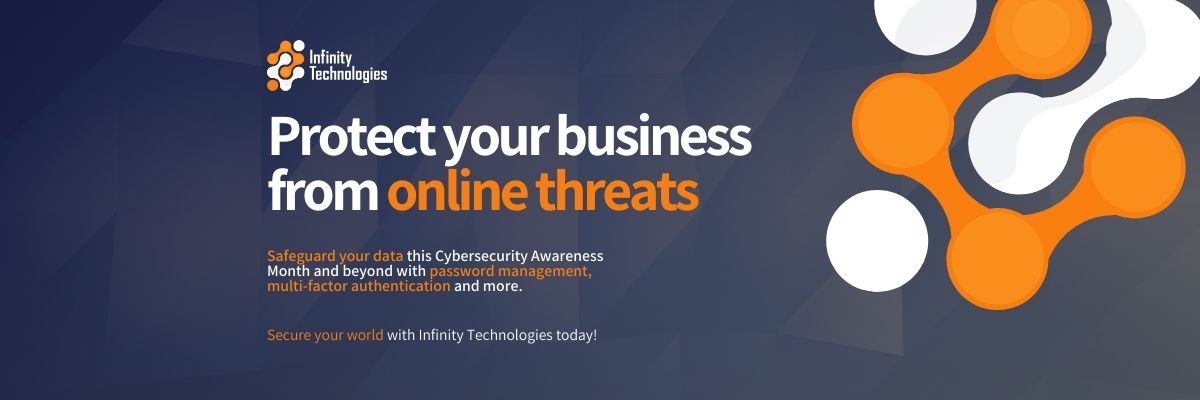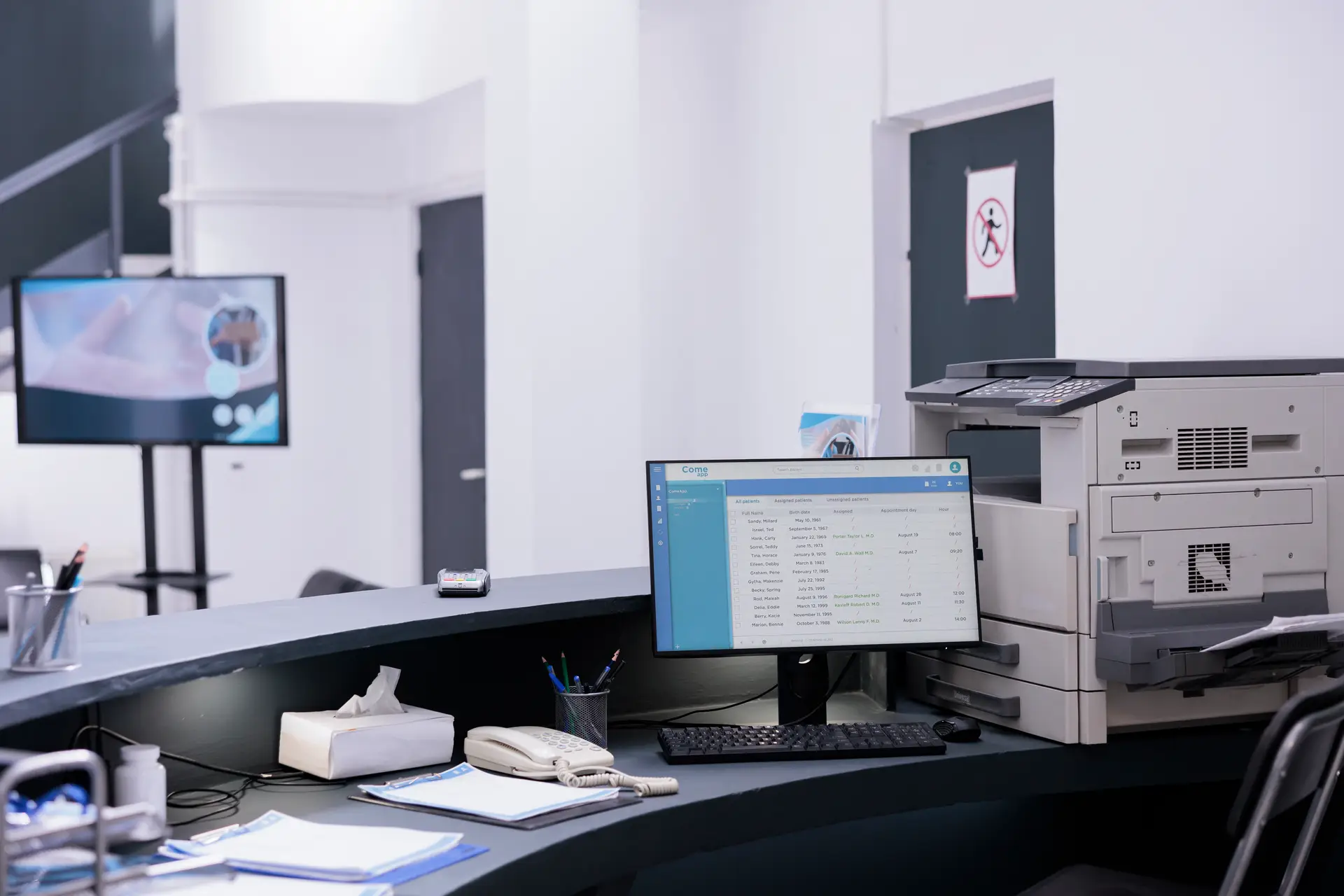October marks Cybersecurity Awareness Month, and this year’s theme, Secure Our World, focuses on protecting individuals and businesses from the increasing threat of cyberattacks. With more data being stored online and an ever-growing digital landscape, it’s critical to implement best practices to stay safe. In this blog, we’ll highlight key strategies you can use to secure your online presence and how Infinity Technologies can help safeguard your business year-round.
- Use Strong, Unique Passwords
A strong, unique password is one of the most effective defenses against cyberattacks. Cybercriminals often exploit weak passwords to gain access to sensitive accounts, making it crucial to create passwords that are difficult to crack. A strong password should be lengthy; aim for a minimum of a dozen characters. The longer the password, the more secure it becomes.
In addition to length, complexity is key. Mix upper- and lowercase letters with numbers and special symbols to create a password that isn’t easily guessed. Avoid common words, phrases, or predictable patterns like “password123” or your name followed by a series of numbers. Instead, consider using passphrases, random combinations of unrelated words that are easy for you to remember but hard for others to figure out.
Uniqueness is just as important as complexity. Using the same password across multiple accounts creates a single point of failure. If one account is compromised, all others with the same password become vulnerable. That’s why it’s critical to use a different password for every account, especially for accounts that hold sensitive or financial information.
Managing multiple, complex passwords can be overwhelming, but using a password manager is a perfect solution. Password managers securely store your credentials and can even generate random, strong passwords for you, making it easier to maintain robust security across all your accounts.
- Enable Multi-Factor Authentication (MFA)
While a strong password is essential, it may not be enough on its own to fully protect your accounts from cybercriminals. Multi-factor authentication (MFA) adds an extra layer of security by requiring a second form of verification beyond just your password. This additional step makes it significantly harder for attackers to gain access, even if they manage to steal your password.
MFA works by combining something you know (your password) with something you have (like a one-time code sent to your phone) or something you are (such as a fingerprint or facial recognition). By introducing this second factor, you create a nearly impenetrable defense for your accounts.
Implementing MFA across all your critical accounts—especially email, cloud storage, and financial systems—is highly recommended. Many services now offer easy-to-enable MFA options, such as sending a unique code via SMS, generating one-time passcodes through an authenticator app, or utilizing biometric verification like fingerprint or face scans.
The benefits of MFA are significant. Even if a hacker manages to guess or steal your password, they still need that second verification step to access your account, making unauthorized entry much more difficult. Moreover, MFA is often free to set up, making it a cost-effective and powerful way to boost your cybersecurity.
- Be Wary of Phishing Attacks
Phishing attacks are one of the most common and deceptive methods cybercriminals use to steal sensitive information. These attacks typically come in the form of emails, text messages, or even phone calls that appear to be from legitimate sources, such as your bank, a trusted service provider, or a known colleague. The goal is to trick you into clicking a malicious link, downloading a harmful attachment, or providing confidential details like passwords or financial information.
Phishing attacks can be difficult to spot because they often mimic real, recognizable brands and may use urgent language to prompt immediate action. For instance, you might receive an email claiming your account has been compromised and asking you to verify your credentials. Clicking on these links often leads to fake websites designed to capture your login information.
Recognizing phishing attempts is critical to protecting yourself and your business. Be cautious of any unexpected emails or messages that ask for personal information, especially if they create a sense of urgency. Common warning signs include unfamiliar email addresses, misspellings, suspicious links, and attachments that don’t seem relevant. Always double-check the sender’s email address and be skeptical of emails that ask for sensitive data.
To protect yourself, never click on links or download attachments from unknown sources. Instead, go directly to the company’s website by typing the URL into your browser or calling them directly to verify the message. Educating your employees about these tactics is also crucial, as human error is often the easiest way for a phishing attack to succeed.
- Keep Software and Systems Updated
Keeping your software and systems updated is one of the simplest yet most important steps you can take to protect your business from cyberattacks. Cybercriminals often exploit vulnerabilities in outdated software, using these security gaps to gain access to your systems and sensitive data. When software developers release updates or patches, it’s often because they’ve identified weaknesses that need to be fixed. Ignoring these updates leaves your systems exposed to potential attacks.
Regularly updating your operating systems, applications, and security tools ensures you have the latest protections in place. These updates not only fix security vulnerabilities but also improve performance and introduce new features. For instance, an outdated web browser may not only be slower but also lack critical protections against malware or phishing attempts.
Many businesses overlook the importance of updating software consistently, often delaying updates because they feel it’s inconvenient or may cause temporary disruptions. However, delaying updates can be risky, especially when it comes to core business applications like email, financial systems, and cloud platforms. It’s far more disruptive to suffer a data breach or ransomware attack than to take a few minutes to install critical updates.
To streamline this process, it’s a good idea to set up automatic updates wherever possible. This ensures that your systems stay secure without the need for manual intervention. For larger, more complex systems, regular monitoring and scheduled updates may be necessary to avoid compatibility issues.
How Infinity Technologies Can Help
At Infinity Technologies, we offer a comprehensive range of managed services designed to help businesses strengthen their cybersecurity and stay protected from evolving threats.
- Cybersecurity Audits and Vulnerability Assessments: We conduct thorough audits of your systems to identify any security weaknesses and recommend tailored solutions to fix them. Our assessments help ensure your software and infrastructure are up-to-date and secure.
- Password Management Solutions: We assist in implementing password policies and provide secure password management tools to ensure your team uses strong, unique passwords for each account, reducing the risk of password-related breaches.
- Multi-Factor Authentication Setup: Infinity Technologies helps set up and enforce multi-factor authentication (MFA) across your critical accounts, adding an extra layer of security to prevent unauthorized access.
- Cybersecurity Awareness Training: We offer customized training programs to educate your employees on recognizing phishing attacks, safe browsing practices, and the importance of cybersecurity hygiene, reducing the risk of human error.
- Automated Patch Management: Our team ensures that all your software and systems are regularly updated with the latest security patches, closing potential entry points for cybercriminals and protecting your data.
- Data Backup and Recovery Solutions: We provide reliable, cloud-based and offline backup solutions to protect your data from loss or ransomware attacks, ensuring quick recovery in the event of an emergency.
- Network Security and Monitoring: We set up and manage advanced firewalls, antivirus software, and secure networks, monitoring for any suspicious activity and mitigating threats before they impact your business.
Cybersecurity is essential to protecting your business from the ever-evolving landscape of cyberattacks. By using strong passwords, enabling MFA, staying vigilant against phishing, keeping software updated, backing up your data, and securing your network, you can significantly reduce the risk of a cyberattack. Infinity Technologies is here to help you implement these best practices and ensure your business remains secure during Cybersecurity Awareness Month and beyond.
For more information on how we can help, contact us today!



